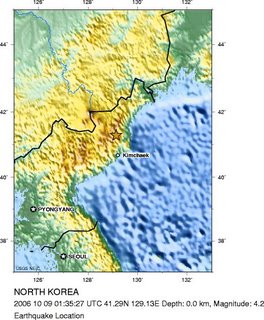Washington Post, Oct. 9, 2006:
"In late 2002, North Korea took a series of steps including kicking out international weapons inspectors and reprocessing plutonium in defiance of the international community.Seymour Hersh, "The Cold Test" (New Yorker, January 1, 2003):
"The Bush administration rebuffed North Korea's calls for bilateral talks to solve the crisis, instead pushing for an international framework that forced the North to the bargaining table with the United States, but also China, Japan, Russia and South Korea.
"Monday's test, analysts said, provided unmistakable evidence that the six-party framework had failed, leaving Washington and its partners in the region now facing the profoundly more difficult task of disarming a state that has already fulfilled its nuclear ambitions."
"The Administration's fitful North Korea policy, with its mixture of anger and seeming complacency, is in many ways a consequence of its unrelenting focus on Iraq."Philip Gourevitch, "Armies of the North" (New Yorker, Sept. 1, 2003):
***
"The Administration's goal... was to mobilize public opinion for an invasion of Iraq. One American intelligence official told me, 'The Bush doctrine says MAD' —- mutual assured destruction -— 'will not work for these rogue nations, and therefore we have to preëmpt if negotiations don't work. And the Bush people knew that the North Koreans had already reinvigorated their programs and were more dangerous than Iraq. But they didn't tell anyone. They have bankrupted their own policy -- thus far -- by not doing what their doctrine calls for.'"
"The focus of this Administration has been on Iraq rather exclusively, and anything that had to do with North Korea was going to be viewed as a distraction from Iraq. It was more like 'After Iraq, we’ll deal with you.' Well, North Korea didn’t feel like waiting. They thought this was a good time to catch America off balance: 'America’s busy somewhere else; we’re going to get in its face.'"Hendrick Herzberg, "Snake Eyes" (New Yorker, Aug. 21, 2006):
"The dice have now been well and truly rolled, and they have come up snake eyes. The war’s sole real gain—the overthrow of the murderous Saddam Hussein regime—is mocked by the chaos and suffering that have overwhelmed millions of Iraqis, whose country is again a republic of fear. The concrete losses are horrific: nearly three thousand American and “coalition” troops killed; thousands more maimed; scores of thousands of Iraqi civilians dead; a third of a trillion dollars burned through. So are the less tangible ones: the unprecedented levels of anti-Americanism throughout the Muslim world and Europe; the self-inflicted loss of America’s moral prestige; the neglect of real nuclear dangers, in Iran and North Korea, while chimeras were chased in Iraq. The neoconservative project of a friendly, democratic Middle East, with Israel and Palestine living side by side in peace, is worse than a charred ruin—it is a flaming inferno."
Amplification Dept.
See also, "Rolling Blunder: How the Bush Administration Let North Korea Get Nukes," Washington Monthly (May 2004) [HT to TPM]:
"The pattern of decision making that led to this debacle--as described to me in recent interviews with key former administration officials who participated in the events--will sound familiar to anyone who has watched Bush and his cabinet in action. It is a pattern of wishful thinking, blinding moral outrage, willful ignorance of foreign cultures, a naive faith in American triumphalism, a contempt for the messy compromises of diplomacy, and a knee-jerk refusal to do anything the way the Clinton administration did it."








No comments:
Post a Comment